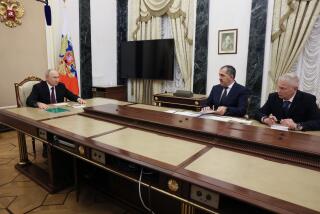Military Chief of CIS Defects to Russian Post : Ex-republics: Switch to national security council signals an end to the Commonwealth’s defense alliance.
- Share via
MOSCOW — The military commander of the Commonwealth of Independent States left his job Friday to head Russia’s national security council, a sign that the dream of a NATO-style joint defense structure among former Soviet republics is over.
Air Marshal Yevgeny I. Shaposhnikov assumed his Commonwealth command after the Soviet Union collapsed in late 1991. At the time, it appeared to be a powerful position, controlling the Soviet army’s scattered nuclear arsenals and conventional forces in 11 newly independent countries.
But Shaposhnikov’s role quickly shrank to that of a figurehead as nations along Russia’s border, then Russia itself, formed national armies and distributed conventional weapons among themselves. Although he kept nominal control of nuclear warheads still in Russia, Ukraine, Belarus and Kazakhstan, it became clear that ultimate control remained in the Kremlin.
A commander without troops, Shaposhnikov had been working to bring a security treaty to life in the form of a Collective Security Council that would coordinate air defense systems, border patrols and peacekeeping forces. But Russia’s Defense Ministry vetoed the idea last month.
In a recent interview with the Moscow News, the 51-year-old commander said Russia’s decision was “sad” and might push its poorer neighbors into defense alliances with Eastern European or Islamic nations, introducing destabilizing “zones of rivalry” in the former Soviet empire.
The demise of the defense alliance reflects the overall weakness of the Commonwealth itself, now reduced to 10 nations whose leaders often voice support for restoring some economic ties broken by the Soviet collapse but end up doing little.
“Shaposhnikov’s departure is an acknowledgment that the Commonwealth is powerless,” said Ilana Kass, professor of military strategy at the National War College in Washington.
Russian President Boris N. Yeltsin signed without comment a decree making Shaposhnikov, a Yeltsin defender during the failed hard-line Soviet takeover of 1991, his top security adviser. Shaposhnikov will replace Yuri V. Skokov, who was fired last month for opposing Yeltsin’s plan to introduce strong presidential rule.
The Itar-Tass news agency reported that Shaposhnikov is expected to be replaced in the Commonwealth command by Boris V. Gromov, Russia’s deputy defense minister. The appointment would have to be approved by the Commonwealth heads of state.
Gromov, 45, won respect from his troops as the last Soviet commander in the Afghanistan war but is regarded as a hard-line nationalist in Russia’s dealings with its neighbors.
More to Read
Sign up for Essential California
The most important California stories and recommendations in your inbox every morning.
You may occasionally receive promotional content from the Los Angeles Times.










